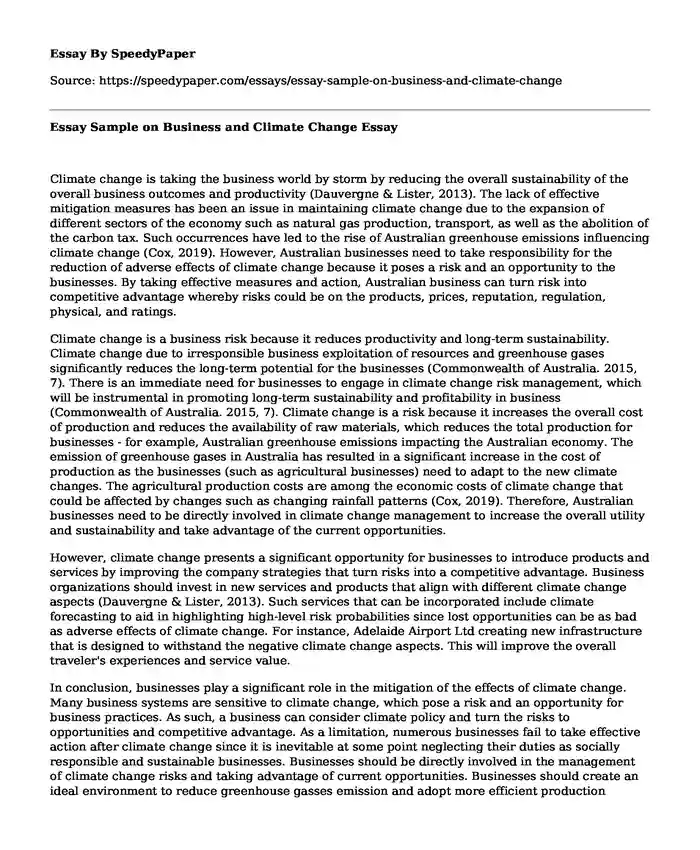
| Type of paper: | Essay |
| Categories: | Business Climate Climate change |
| Pages: | 3 |
| Wordcount: | 659 words |
Climate change is taking the business world by storm by reducing the overall sustainability of the overall business outcomes and productivity (Dauvergne & Lister, 2013). The lack of effective mitigation measures has been an issue in maintaining climate change due to the expansion of different sectors of the economy such as natural gas production, transport, as well as the abolition of the carbon tax. Such occurrences have led to the rise of Australian greenhouse emissions influencing climate change (Cox, 2019). However, Australian businesses need to take responsibility for the reduction of adverse effects of climate change because it poses a risk and an opportunity to the businesses. By taking effective measures and action, Australian business can turn risk into competitive advantage whereby risks could be on the products, prices, reputation, regulation, physical, and ratings.
Climate change is a business risk because it reduces productivity and long-term sustainability. Climate change due to irresponsible business exploitation of resources and greenhouse gases significantly reduces the long-term potential for the businesses (Commonwealth of Australia. 2015, 7). There is an immediate need for businesses to engage in climate change risk management, which will be instrumental in promoting long-term sustainability and profitability in business (Commonwealth of Australia. 2015, 7). Climate change is a risk because it increases the overall cost of production and reduces the availability of raw materials, which reduces the total production for businesses - for example, Australian greenhouse emissions impacting the Australian economy. The emission of greenhouse gases in Australia has resulted in a significant increase in the cost of production as the businesses (such as agricultural businesses) need to adapt to the new climate changes. The agricultural production costs are among the economic costs of climate change that could be affected by changes such as changing rainfall patterns (Cox, 2019). Therefore, Australian businesses need to be directly involved in climate change management to increase the overall utility and sustainability and take advantage of the current opportunities.
However, climate change presents a significant opportunity for businesses to introduce products and services by improving the company strategies that turn risks into a competitive advantage. Business organizations should invest in new services and products that align with different climate change aspects (Dauvergne & Lister, 2013). Such services that can be incorporated include climate forecasting to aid in highlighting high-level risk probabilities since lost opportunities can be as bad as adverse effects of climate change. For instance, Adelaide Airport Ltd creating new infrastructure that is designed to withstand the negative climate change aspects. This will improve the overall traveler's experiences and service value.
In conclusion, businesses play a significant role in the mitigation of the effects of climate change. Many business systems are sensitive to climate change, which pose a risk and an opportunity for business practices. As such, a business can consider climate policy and turn the risks to opportunities and competitive advantage. As a limitation, numerous businesses fail to take effective action after climate change since it is inevitable at some point neglecting their duties as socially responsible and sustainable businesses. Businesses should be directly involved in the management of climate change risks and taking advantage of current opportunities. Businesses should create an ideal environment to reduce greenhouse gasses emission and adopt more efficient production methods that reduce the overall environmental aspects. As such, climate change will be instrumental in increasing the number of services and value to meet new consumer utilities. Management of climate change by businesses will be instrumental in improving the overall sustainability of operations and raw materials.
References
Dauvergne, P., & Lister, J. (2013). Ecobusiness: A big brand takeover of sustainability. Cambridge, MA: The MIT Press.
Commonwealth of Australia (2015). National climate resilience and adaptation strategy. Canberra, Australia: Author. Retrieved from https://www.environment.gov.au/system/files/resources/3b44e21e2a784809 87c7a1386e350c29/files/nationalclimateresilienceandadaptation strategy.pdf
Cox, J. (2019, June 6). Australia's emissions still rising, says report withheld in defiance of Senate order. The Guardian. Retrieved from https://www.theguardian.com/environment/2019/jun/06/australiasemissions still risingsaysreportwithheldindefianceofsenateorder
Cite this page
Essay Sample on Business and Climate Change. (2023, Jan 31). Retrieved from https://speedypaper.com/essays/essay-sample-on-business-and-climate-change
Request Removal
If you are the original author of this essay and no longer wish to have it published on the SpeedyPaper website, please click below to request its removal:
- Free Essay Sample on The Black Lives Matter Movement
- Role of Social Media Essay Sample
- Essay Sample on Criminal Law Special Interest Influences
- Personal Essay Sample: Boston Marathon Reflection on Patriotism
- Kate Chopin's Desiree's Baby as a Tale of Destiny and Prejudice
- Essay Sample Analyzing The Great Gatsby by Scott Fitzgerald
- Free Essay: Explain if Drivers Should or Should Not Be Able to Use Cell Phones While Driving
Popular categories




